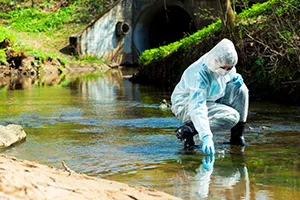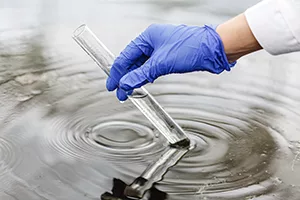
At The Collins Law Firm, our environmental lawyers have represented thousands of clients affected by toxic chemical contamination. For over twenty years, we have been taking the fight directly to polluters and holding them accountable for the damage they have done. This can be seen in the results we have achieved. Our environmental contamination attorneys have recovered many millions of dollars in toxic chemical testing and cleanup for our clients, as well as over $100 million for lost property value, other damages caused by the contamination, and toxic- chemical-related illnesses. Moreover, we have secured chemical-free drinking water and clean air for thousands of our clients. If you are concerned about PFAS contamination in your drinking water, call our PFAS contamination lawyers and let us fight to get you justice.

When Teflon pans were first introduced in the 1950s, they were hailed as an amazing invention capable of making life easier. We now know that the chemical used to make Teflon, perfluorooctanoic acid (PFOA), is a long-lasting toxic chemical that has been polluting the country for decades. Moreover, PFOA is just one type of a family of toxic chemicals called PFAS that are responsible for a nationwide contamination crisis. The extent of that contamination is massive; scientists have discovered PFAS contamination in thousands of locations across the United States. In fact, millions of Americans are likely to have measurable amounts of PFAS in their blood because the contamination is so widespread.
The term PFAS is short for per- and polyfluoroalkyl substances, a family of man-made chemicals—including PFOA and PFOS-- that can have serious consequences for our health. These chemicals are resistant to grease and water which is why they are used in so many products. However, PFAS are extremely persistent in the environment and the human body and have been linked to a host of health issues.

Exposure to PFAS is mostly through the ingestion of contaminated food and water or the use of products that contain the chemical. PFAS are common in adhesives, firefighting foam, and electrical wire insulation but they are also present in clothing, fast food packaging, furniture, carpeting, non-stick cookware, and personal care products. The use of PFAS is so widespread that most Americans have been exposed to the chemicals at one time or another. Manufacturing releases of PFAS into the environment and the use of firefighting foam are the main sources of drinking water contamination, but you can also be exposed to PFAS through food and a myriad of products containing PFAS. Routes of exposure include:

PFAS pose multiple health risks for humans, including:
Once we are exposed to PFAS, the chemicals stay in the blood for a long time, which is why they are referred to as “forever chemicals”. As a result, even low-level exposures to PFAS can cause health issues since the chemicals can accumulate in our bodies over time.
Community testing for PFAS in blood can provide valuable information to residents about levels of PFAS in their bodies compared to other communities. For example, the Centers for Disease Control and Prevention (CDC) and the Agency for Toxic Substances and Disease Registry (ATSDR) conducted PFAS testing on residents of eight communities near current or former military bases with PFAS in their drinking water, to provide those residents with information about their PFAS exposure. If you are concerned about PFAS contamination in your community, contact your state and local health departments to see if any testing is being conducted. You may also choose to have your blood tested individually. Test results will tell you the levels of each PFAS in your blood but not what those results mean in terms of possible health effects. The results will also allow you to compare your PFAS levels to national averages. However, this is not a routine test and may not be covered by insurance.
PFAS contamination in the U.S. is extensive. From military bases to fire stations, from airports to big cities and rural towns, PFAS contamination has been found in 49 states. Wisconsin is monitoring more than 40 PFAS contamination sites. Dozens of drinking water systems in Pennsylvania, California, Michigan, Colorado, and Ohio are contaminated with PFAS. In North Carolina, it is estimated that more than one million residents’ drinking water is contaminated with PFAS. Illinois has announced they will be testing all 1749 community water supplies for PFAS. And hundreds of military bases across the country have been contaminated by firefighting foam. Yet the Federal Government has been slow to take action to regulate PFAS and clean up the contamination.

The US EPA has established a PFAS health advisory level of 70 parts per trillion (ppt) in drinking water, however, independent scientific studies have recommended a PFAS level of 1 part per trillion in drinking water. Moreover, despite the fact the EPA regulates over 90 other toxic chemicals, there are still no maximum contaminant levels for any PFAS. In January of this year, the EPA announced that they are finally moving forward in the process to issue final regulatory determinations on PFAS. In the meantime, some states have begun setting their own legal limits, many at or around 13-14 ppt depending on the specific chemical. While these limits are still far too high, it is progress.
In the absence of federal regulation, it is up to us to educate ourselves and do what we can to limit our family’s exposure to PFAS. Moreover, we can put pressure on our representatives to move forward on legislation to deal with this crisis.
If you suspect your drinking water is contaminated with PFAS, contact the environmental attorneys at The Collins Law Firm as soon as possible. We have over 20 years, of experience helping clients impacted by environmental contamination in their air, water, and soil. Our long record of success taking on the biggest polluters in the country speaks for itself. Let our PFAS contamination lawyers help you get answers and hold the polluter accountable. Call us at (630) 527-1595 or fill out our contact form as soon as possible for a FREE EVALUATION of your case.
"*" indicates required fields











I had an excellent experience being represented by Collins Law Firm. Ed Manzke and Amber Blevins were amazing to work with and truly helped me in my time of need. Both were extremely personable and knowledgeable throughout every step of the way. I would absolutely recommend them for anyone’s legal needs.